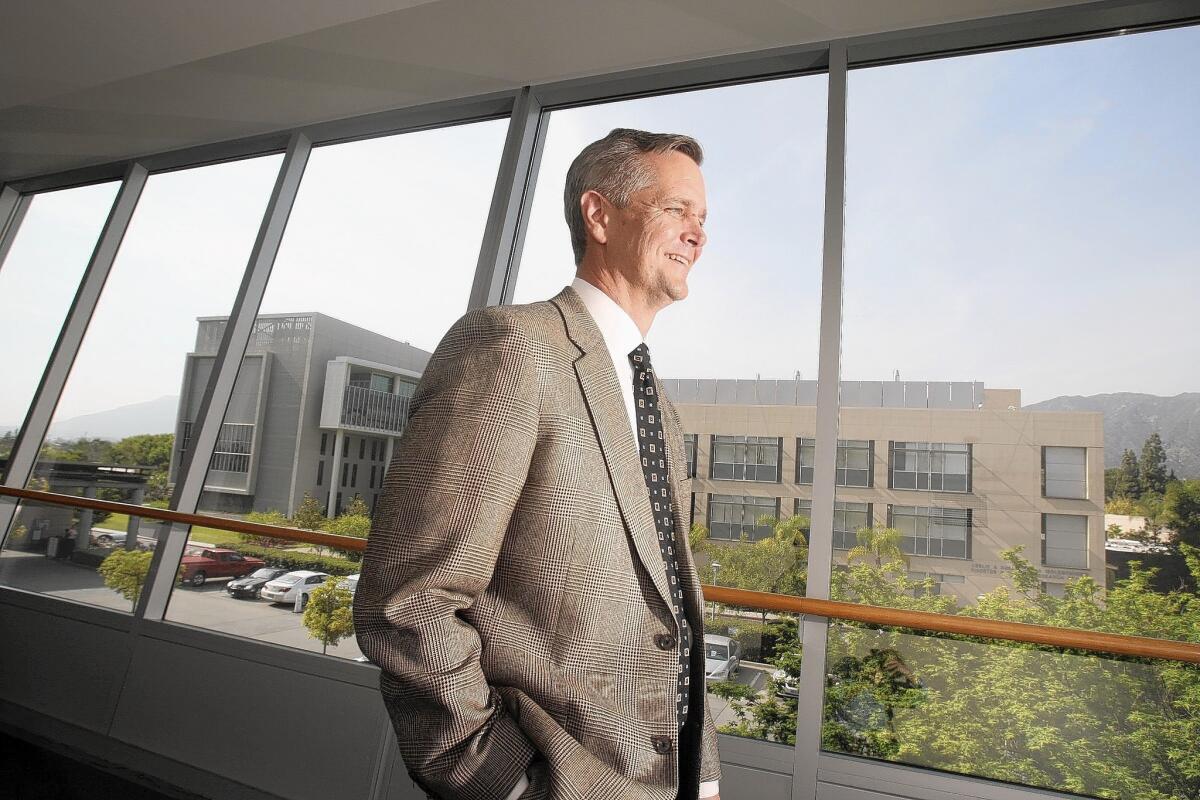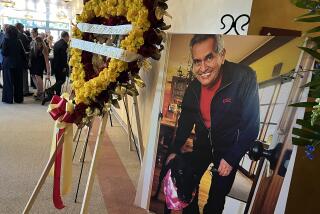For City of Hope CEO, it’s about ‘something bigger’ than himself

The gig: Robert W. Stone is president and chief executive of City of Hope, a federally recognized comprehensive cancer treatment center at the foot of the San Gabriel Mountains in Duarte. It specializes in cancer treatment and research.
In addition to a 212-bed hospital, City of Hope offers outpatient services in South Pasadena, Palm Springs, Mission Hills, Santa Clarita and Lancaster. It employs about 4,000 people and brought in about $1.4 billion in revenue last year. After 17 years with City of Hope, first on its legal team and then as president of its medical foundation, Stone, 46, was appointed CEO in January.
Southern California native: Raised in Whittier, Stone attended the University of Redlands and played basketball there for four seasons, earning a bachelor’s degree in political science. He was named to the Academic All-America team by the College Sports Information Directors of America and ranks 15th at Redlands in career points scored with 1,077. “I never envisioned being a CEO,” he said. “I went to Redlands to play basketball.”
He went on to earn a law degree at the University of Chicago and quickly returned to California to practice business law. “Chicago was so cold. I froze and came back here,” he said. “There’s no way to prepare for 40 below.”
Little red wagon: After three years in private legal practice, Stone was wooed by City of Hope to join its legal team as associate general counsel. He has been there ever since.
Stone recalls walking the hospital grounds and seeing a nurse towing a cancer-stricken child in a red wagon with the boy’s mother walking behind, pushing her son’s IV stand. That was a turning point: Practicing law is one thing, but helping cancer patients and their families gave his career purpose.
“You have to find your passion,” Stone said. “I have a great education, but that wasn’t me. Law was a means to the end, rather than an end, for me.”
Raised for success: Stone credits his parents for his success academically and in the professional world. His father managed the Los Angeles County Department of Public Works; his mother was a political science professor at Cal State Fullerton. “I did it with the help of people who motivated me, guided me, pushed me,” he said. “My mom’s ability to understand people and how organizations and things fit together, I got from her at a very early age.”
Personal: Stone lives in Pasadena with his wife of 18 years, Charlotte, and their children, Ellie, 11, and Thomas, 9.
More than a hospital: On its sprawling campus, City of Hope has both a hospital and a research institute, devoted primarily to studying new treatments for cancer and diabetes. City of Hope also has three manufacturing facilities at which it makes treatments for cancer and other diseases. Last year, City of Hope received nearly $250 million in royalties for its researchers’ contributions to the development of several drugs.
It is one of 41 facilities nationwide designated as a comprehensive cancer center by the National Cancer Institute.
Obamacare’s effect: “Health reform provides City of Hope with the unique opportunity to expand access to its care to more and more people,” Stone said.
But it’s too early to tell how it will affect City of Hope’s business, he said. “We have not seen a material impact, positive or negative.”
Climbing the ladder: “Find a passion,” he said. “And then find an organization that fits your passion.”
Employees who are motivated by City of Hope’s mission to cure cancer and help those suffering from the disease are the most successful, he said. “People who do well here, including me, understand it really is about something bigger than themselves. This is a special place. You have the ability to see close up the patients and the families that you’re helping.”
Twitter: @spfeifer22
More to Read
Inside the business of entertainment
The Wide Shot brings you news, analysis and insights on everything from streaming wars to production — and what it all means for the future.
You may occasionally receive promotional content from the Los Angeles Times.











